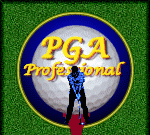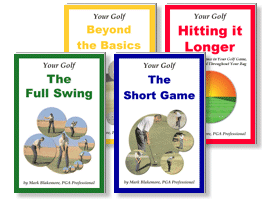Free Golf Instruction Book
|
|||||
|
| Page 12 |
Part B - Basic Fundamentals and Concepts in Golf Swing Technique (continued)
Some Laws of the Universe
The flight of the ball is governed by the speed the club is traveling, the centeredness of contact, the path of the club, the position/angle/orientation of the clubface, and its angle of approach. If the ball is contacted with the face of the club the ball will mainly go where the face of the club was "looking" when the ball left it.
Some examples:
- If the ball rolls on the ground it was likely not contacted with the face of the club, it was probably contacted with the bottom or side of the club, or the face was so closed (really not square) as to present 0° of loft or less.
- If the ball curves in flight it is because the club has struck the ball a glancing blow, causing sideways, or tilted, backspin (i.e., the direction the club was traveling at the moment of impact was different than the direction the face of the club was looking).
- Given the same club head speed, a ball will go farther the nearer to the center of the club's face (sweet spot) it is contacted and the closer the directional orientation of the club face is at a right angle (square or perpendicular) to the path the club is traveling on.
Some things to avoid
- Trying to hit the ball hard
Do not swing hard at the ball or try to hit it far. This is a powerful instinct to overcome. I assure you that no matter how right it feels to swing hard it is a mistake (the number of times that this has been said is uncountable). Yes, I know Tiger Woods swings hard. You are not him -- yet. Once your nervous system has memorized the correct sequence and rhythm of the movements they are easily accelerated -- not before. - Looking to see where the ball is going too soon
Make certain that you have made contact with the ball (by staying in your posture through the impact area) before you look to see where it goes. Interestingly, if you make decent contact with the ball it stays in the air plenty long enough to see it. - Tensing every muscle in your body
Avoid excessive tension (this might be easier said than done from what I sometimes see). If you aren't able to relax a bit and cultivate some sensitivity for the movements your body is making and some feel for the clubs it will be very difficult to excel at golf. If you are a chronically tense, rigid, anxious or uptight person, I'd like to suggest that you also try practicing Tai Chi, Yoga -- or both -- to help in this area. Body awareness and feel are a big part of the difference between a highly-skilled player and a not-so-highly-skilled player. (If you're assuming that golf is not a physically demanding sport just wait and see how sore you are the day after hitting practice balls with tension in your body.) - Golf tips or instruction from unqualified people
Avoid instruction or tips from unqualified people (especially if they're your "significant other"). Yes, they may be better than you, they may even be spectacular. Yes, their intentions are probably good. But there is too much potential for miscommunication and developing bad habits (see Step 3).
Obviously, this Part B section is far from a comprehensive description of golf swing mechanics, and is not meant to be. Again, the details are endless, this book is for absolute beginners, and this section of the book is mainly for people who aren't comfortable taking lessons yet.
|
Learn More About Golf Technique For more information on golf technique get my 4-volume series of paperback books covering the entire game in detail. The first volume is on The Full Swing, the second volume is on The Short Game, the third volume is on some more specific techniques for when you start making your way out onto the course and have developed some of the basics, called Beyond the Basics, and the last volume is on Hitting it Longer.
|
The next section of the ABC's of Golf for beginners is a glossary of common golf terms and phrases, arranged one letter per page.
|
If you have a suggestion as to how this book could be an even better resource for brand
new golfers or feedback of any kind please
|

